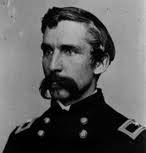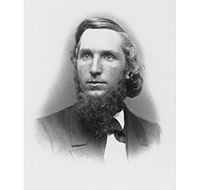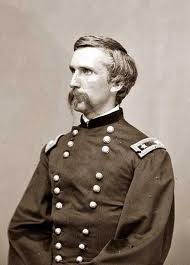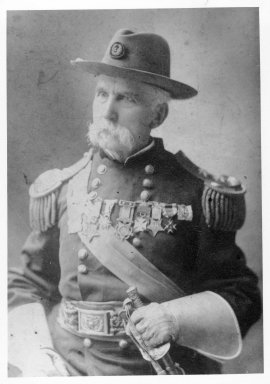 Chamberlain was a Maine Patriot, but he was also a Brave Bowdoin Professor. During the Civil War, many answered the call to defend the Union and for varying reasons. One such volunteer’s enlistment was based on his belief of the integrity of country and a firm resolve to suppress treason. Chamberlain stated,
Chamberlain was a Maine Patriot, but he was also a Brave Bowdoin Professor. During the Civil War, many answered the call to defend the Union and for varying reasons. One such volunteer’s enlistment was based on his belief of the integrity of country and a firm resolve to suppress treason. Chamberlain stated,
“I fear, this war, so costly of blood and treasure, will not cease until men of the North are willing to leave good positions, and sacrifice the dearest personal interests, to rescue our country from desolation, and defend the national existence against treachery.”
 Lawrence Joshua Chamberlain, a native of Maine, was born in 1828. He descended from a long line of military officers, his grandfather, a Colonel in the War of 1812 and his father, also a veteran, was a demanding task master, who instilled in his oldest son a drive and tenacity for perfection. Chamberlain was a brilliant student and attended a Military Preparatory Institute, with the intent of attending the United States Military Academy. However, in 1848, he entered Bowdoin College, where he began using Joshua as his first name. In 1852, Chamberlain graduated Phi Beta Kappa with his bachelor’s degree from Bowdoin. By 1855, Joshua had graduated from both a three-year seminary course at Bangor Theological Seminary and Bowdoin College with his master’s degree.
Lawrence Joshua Chamberlain, a native of Maine, was born in 1828. He descended from a long line of military officers, his grandfather, a Colonel in the War of 1812 and his father, also a veteran, was a demanding task master, who instilled in his oldest son a drive and tenacity for perfection. Chamberlain was a brilliant student and attended a Military Preparatory Institute, with the intent of attending the United States Military Academy. However, in 1848, he entered Bowdoin College, where he began using Joshua as his first name. In 1852, Chamberlain graduated Phi Beta Kappa with his bachelor’s degree from Bowdoin. By 1855, Joshua had graduated from both a three-year seminary course at Bangor Theological Seminary and Bowdoin College with his master’s degree.
By 1856, Chamberlain was a professor of rhetoric at Bowdoin, who was fluent in nine foreign languages and taught all curriculums, except science and mathematics. In addition, in 1861, the young professor was elected chair of modern languages. With the outbreak of the Civil War in 1861, Joshua felt a strong desire to serve his country. Having already been granted a leave of absence for study in Europe, Joshua decided to offer his services in the military to Governor Washburn. By August 1862, Chamberlain entered the war as Lieutenant Colonel of the 20th Regiment of Maine Volunteers.
Serving under Colonel Adelbert Ames, a West Point graduate, Chamberlain and the 20th Maine mustered in on August 20, 1862. The scholar-turned-soldier would take advantage of his position as second-in-command and studied “every military work I can find” under the close supervision of Ames. Chamberlain witnessed the transformation of more than 900 unskilled men into trained and disciplined soldiers. Among the officers of the regiment was Joshua’s brother Thomas. Tom, the youngest of the Chamberlain’s, was appointed a non-commissioned sergeant. Before the end of the war, he would serve as a lieutenant colonel.
Assigned to the V Corps of the Army of the Potomac, the 20th Maine served at Antietam, but did not see action. Later that fall, the regiment was part of the attack on Marye’s Heights during the Battle of Fredericksburg. Though the regiment suffered relatively light casualties, Chamberlain was forced to spend the night on the cold battlefield using corpses for protection against Confederate fire. This experience and the horrors and carnage of battle, would leave a lasting impression on Joshua Chamberlain, that would mold and harden him for future commands.
Chamberlain was appointed Colonel of his regiment, in late May of 1863 and on July 2, the regiment entered action at Gettysburg. Commanded to hold Little Round Top, the 20th Maine repelled repeated up hill attacks from the 15th Alabama. With his men running low on ammunition, Chamberlain ordered a bayonet charge which surprised and demoralized the Confederates, most throwing down their arms and surrendering.
Chamberlain would receive the Congressional Medal of Honor many years after the
war ended for his “daring heroism” on Little Round Top and for “carrying the
advance position on the Great Round Top.”
 In May of 1864, Chamberlain was promoted to brigade command and in June while leading his troops at Petersburg, was wounded severely, but still encouraged his boys, before passing out from loss of blood. Lt. Gen. Ulysses S. Grant, hearing reports that the wounds were mortal, promoted Chamberlain to brigadier general as a final act. However, Joshua Chamberlain, beat the odds, recovering and returning to duty by late November.
In May of 1864, Chamberlain was promoted to brigade command and in June while leading his troops at Petersburg, was wounded severely, but still encouraged his boys, before passing out from loss of blood. Lt. Gen. Ulysses S. Grant, hearing reports that the wounds were mortal, promoted Chamberlain to brigadier general as a final act. However, Joshua Chamberlain, beat the odds, recovering and returning to duty by late November.
Returning to duty in November 1864, Chamberlain served for the remainder of the war. On March 29, 1865, outside Petersburg, wounded again, Chamberlain was breveted to major-general for his gallantry. On April 9, Chamberlain was alerted to the Confederate’s desire to surrender. On April 12, Chamberlain presided over the ceremony and ordered his men to attention and carry arms, as a sign of respect for their fellow countrymen.
 Lawrence Joshua Chamberlain was wounded a total of six times, had at least three horses shot out from under him, distinguished himself and his command, garnered the respect and honor of all who served with him and proved that Chamberlain was not only a Maine Patriot and Brave Bowdoin Professor, but wrote in his book, The Last Review, the humble and eloquent remembrance of his comrades,
Lawrence Joshua Chamberlain was wounded a total of six times, had at least three horses shot out from under him, distinguished himself and his command, garnered the respect and honor of all who served with him and proved that Chamberlain was not only a Maine Patriot and Brave Bowdoin Professor, but wrote in his book, The Last Review, the humble and eloquent remembrance of his comrades,
“Sit down again together, Army of the Potomac! all that are left of us—on the banks of the river whose name we bore, into which we have put new meaning of our own. Take strength from one more touch, ere we pass afar from the closeness of old. The old is young to-day; and the young is passed. Survivors of the fittest,—for the fittest, it seems to us, abide in the glory where we saw them last,—take the grasp of hands, and look into the eyes, without words! Who shall tell what is past and what survives? For there are things born but lately in the years, which belong to the eternities.”
Bummer


My favorite Chamberlain remarks:
Gettysburg, PA (1886)
Chamberlain and other veterans of the 20th Maine Vol INF Regt dedicated their monument on Little Round Top
Chamberlain spoke:
“In great deeds, something abides. On great fields, something stays. Forms change and pass; bodies disappear, but spirits linger, to consecrate the ground for the vision-place of souls. And reverent men and women from afar, and generations that knows us not and that we know not of, heart-drawn to see where and by whom great things were suffered and done for them.”
John,
Thanks for adding the great quote! Chamberlain has always been a favorite, so much has already been written, it’s difficult to say anything poignant. His eloquence is what this “old guy” misses. Thanks for the read.
Bummer
I wondered when you’d get around to Chamberlain, one of the most fascinating figures in a war full of them. A comparison of pictures of him from before the Civil War and during it looks like two different men. His severe wound supposedly never healed, so I think of him as having been shot to death in 1864 but dying in 1914.
Louis,
Chamberlain has so much good to write about. Want to find out more about his younger brother. Traits of genius, yet a warrior mentality. Always fighting for a noble cause. Can’t find any shortcomings. Where is that sort today. If you know, please share!
Bummer